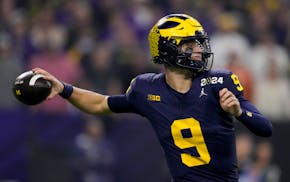We love symbols, because they do not require thought.
Many Twins fans want to believe that Joe Mauer is the cause of his team's woes, instead of analyzing the most important components of every big-league team: the rotation and farm system.
Many Wolves fans want to believe that Kevin Love held his team back, when history will show that the Wolves were worse before he arrived and after he left.
Many Wild fans love to pick on Mikko Koivu, because he wears the captain's "C'', even though most of his team's problems this season have stemmed from illnesses, injuries and goaltending problems.
Many Vikings fans wanted to criticize former offensive coordinator Bill Musgrave for the team's failures, even though the problems for which he was blamed — Cordarrelle Patterson's involvement and Christian Ponder's unreliability — became even worse after Musgrave was fired.
Symbolism should not be confused with causality.
For example:
On Jan. 7, Wild coach Mike Yeo left a practice in anger, breaking his stick on the boards as he left the ice. Because the moment was captured on camera, it became a symbol of the Wild's slump. Had Yeo lost his mind? Or his team?
Yeo's outburst was merely a symbol of frustration.
That wasn't the moment that spurred the Wild toward its current winning streak, or the moment that Yeo panicked with his team in crisis. Yeo has, for the second consecutive season, helped pull his team from the abyss by remaining true to himself, which is harder than it sounds.
Last year, Yeo might have come within a couple of losses from being fired. Instead of allowing the pressure to change him, he responded with a calmness that was reflected in his team's excellent play down the stretch and in the playoffs.
This season, Yeo's job has not been in danger, but his team has faced heightened expectations, dealt with illnesses that swept through the locker room, mourned the death of Zach Parise and Ryan Suter's fathers, watched the team's top two goalies fail and best young players falter.
Before and after he broke his stick, Yeo has, again, remained calm and carried on.
"The one thing I kind of regret is that it was in front of the camera," Yeo said Sunday. "There were a lot of things that happened. I think a lot of people will tell you that that's not the first time they saw emotion from me. It was just the first time it was caught on camera.
"I prefer to do those things behind closed doors. I've tried to forget about it. But thanks for reminding me."
He said that with a smile that is probably a more appropriate symbol than any broken stick.
Last season, the Wild went 5-9 in December, then 23-10-7 the rest of the way.
This season, the Wild went 4-5-3 in December and 5-6-2 in January, but has now won five in a row.
The reasons for this season's resurgence are remarkably simple. Key players became healthy, and Devan Dubnyk brought competence, and sometimes excellence, to the most important position on ice.
To Yeo's credit, when he wasn't breaking sticks in public, he was staying the course, insisting that his defensive system would work again once his best defensemen were available and his goalies began stopping the occasional shot.
"I believe whether it's yourself as the coach, or the captains of your team, I think that's where leadership has to come through," he said. "It's easy to be a good leader when things are going really well. How do you handle that adversity? How do you get back in the fight?
"I do believe that there was a lot of pressure on our team and all of us at that time, and I just look at the play of our leaders lately, and that's something I'm real pleased about. When the heat is on, how do you respond? I think those guys are delivering right now."
Ask Yeo about leadership, and he steers the conversation toward his players. Which is one way to demonstrate leadership.
Jim Souhan's podcast can be heard at souhanunfiltered.com. On Twitter: @SouhanStrib. • jsouhan@startribune.com

Souhan: Now that's a playoff atmosphere, Minnesota!

Souhan: Should Vikings even consider McCarthy in NFL draft?

Souhan: NAW erases Suns' lead, Game 1 advantage with big performance

Souhan: This is KAT's chance to prove Flip Saunders was right


![Marco Scandella of the Minnesota Wild photographed with his modified Nissan GT-R. ] CARLOS GONZALEZ cgonzalez@startribune.com, February 5, 2015, St. P](https://arc.stimg.co/startribunemedia/A6TFFO4T24QV5XIT7HVZDHIR2Y.jpg?w=600&h=600&auto=format%2Ccompress&cs=tinysrgb)